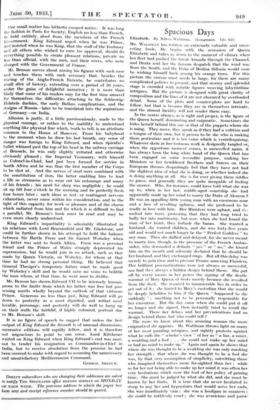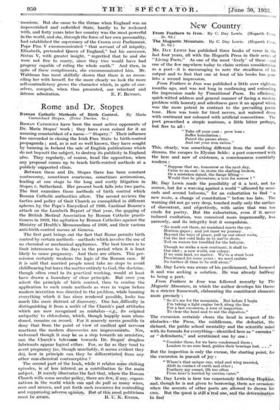Spacious Days
MR. WALDMAN has written an extremely valuable and inter- esting book. He begins with the accession of Queen Elizabeth and takes us down to the moment of climax when her fleet had pushed the Great Armada through the Channel, and Drake sent her the famous despatch that the wind was from the South, and the Duke of Medina Sidonia would soon be wishing himself back among his orange trees. For this picture the canvas must needs be large, for there are plank complicated policies to present, and that stormy; and splendid. stage is crowded with notable figures weaving labyrinthine intrigues. But the picture is designed with great clarity of composition and the fines of it are not obscured by overloaded detail. Some of the plots and counterplots are 'hard tti follow, but that is because they are in themselves intricate, and the utmost lucidity will not render them easy.
In the centre always, as is right and proper, is the figure of the Queen herself, dominating and enigmatic. Sometimes she hides herself behind this one or that of the puppets whom she is using. They move, they speak as if they had a volition and a tongue of their own, but it proves to be she who is making them gesticulate and it is her voice which is ventriloquizing: Whatever skein in her tortuous work is designedly tangled or; when the opportune moment comes, is unravelled again, it has always been the long white hand of the Queen that has been engaged on sonic recondite purpose, making her Ministers or her bewildered Brothers and Sisters on their European thrones despairingly feel that they have not had the slightest idea of what she is doing, or whether indeed she is doing anything at all. She is for ever giving them riddles to guess, and generally they are quite incapable of finding the answer. Who, for instance, could have told what she was up to, when in her last, middle-aged courtship she had apparently made up her mind to marry the Duke of Alencon He was an appalling little young man with an enormous nose and a face of revolting ugliness, and she professed to be madly in love with him. Her Ministers were aghast, and melted into tears, protesting that they had long tried to bully her into matrimony, but now, when she had found the man of her heart, they forbade the banns. She wanted a husband, she wanted children, and she was forty-five years old and would not much longer be the "Perfect Goddess " to any man. Then she dallied and delayed, for she never meant to marry him, though, in the presence of the French Ambas- sador, who demanded a definite " yes " or "no," she kissed hint on the mouth and solemnly declared that he should be her husband, and they exchanged rings. But all this delay was merely to gain time and to prevent France annexing Flanders. Her brilliant procrastinations were not always so successful, nor had they always a hidden design behind them. She put off by every means in her power the signing of the death- warrant of Mary Queen of Scots merely because she revolted front the deed. She resorted to innumerable lies in order to get out of it ; she hinted to Mary's custodian that she would be deeply beholden to him if the Queen "happened to die suddenly" i anything not to be personally responsible for her execution. But the day came when she could put it off no longer and she signed, then instantly tried to recall the' warrant. There her delays and her prevarication' s had no design behind them, but who could tell ? The more we know about this amazing woman the more' enigmatical she appears. Mr. Waldman throws light on many of her most puzzling intrigues, and rightly protests against. what he calls the "scholar's view " of her as "a liar, a miser,. a weakling and a fool . . . she could not make up her mind' or had no mind to make up." Again and again he shows that where she was thought to be a weakling she was only masking her strength ; that where she was thought to be a fool she was, by that very assumption of simplicity, outwitting those who imagined themselves more far-sighted than her : while as for her not being able to make up her mind it was often her very hesitations which were the tool of her policy of gaining time. She must be judged by what she did, and she must be
known by her fruits. It is true that she never hesitated to stoop to any lies and hypocrisies that would serve her ends.'
She WEIR- inordinately vain ; she was a hooligan in manners;' she could be ruthlessly cruel ; she was avaricious and pars': monious. But she came to the throne when England was an impoverished and' enfeebled'" State, hardly, to be' reckoned with, and forty years later her country was the must powerful in the world, and she, through the force of her own personality, had established the supremacy of the Crown over Parliament. Pope Pius V excommunicated "that servant of all iniquity, Elizabeth, pretended Queen of England," but his successor, Sixtus V, with greater insight, "regretted that he and she were not free to marry, since they two would have had progeny capable of ruling the whole earth." And then, in spite of these compliments, she excommunicated him. Mr. Waldman has most skilfully shown that there is no recon- ciling her with herself, for the more closely we look the more self-contradictory grows the character which, in spite of our- selves, compels, when thus presented, our reluctant and











































 Previous page
Previous page